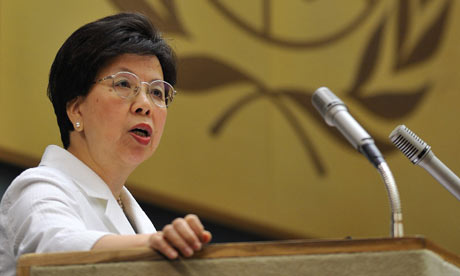
Vaccines to protect millions of Britons from swine flu will not be available for several months, the head of the World Health Organisation warns today.
Her remarks, in an interview with the Guardian, cast serious doubt on ministerial claims in parliament that the first stocks would arrive in August.
Dr Margaret Chan, WHO director general, said: "There's no vaccine. One should be available soon, in August. But having a vaccine available is not the same as having a vaccine that has been proven safe. Clinical trial data will not be available for another two to three months."
One of the world's most respected influenza scientists told the Guardian that health officials have been surprised by the rapid spread of swine flu in the UK. Dr Alan Hay, director of the WHO's London-based World Influenza Centre, said the extensive summer outbreak in Britain had not followed expected patterns and warned that the health department needed to be prepared for a more deadly form of the disease.
"We have been a little surprised by the degree of spread of this virus. A few weeks ago we anticipated that this was going to be a short series of outbreaks that would probably peter out before reappearing in the autumn or winter and that has proved not to be the case," he said.
He said Burnham had been "a bit optimistic" when he told the House of Commons that a flu vaccine would arrive in Britain next month.
Public anxiety about swine flu has risen since the death of six-year-old north-west London schoolgirl Chloe Buckley, who had contracted the virus but had previously apparently enjoyed good health. Sixteen people in the UK have now died after contracting swine flu – although a postmortem revealed yesterday that Bedfordshire GP Dr Michael Day, who was thought to have become the 17th victim, had died as a result of natural causes.
At least 335 people have been treated in hospital after contracting the virus, but tens of thousands are visiting GPs with flu-like symptoms every week, according to the Health Protection Agency.
Andy Burnham, the health secretary, urged people yesterday to keep the threat posed by swine flu "in perspective", noting the vast majority of sufferers made a full recovery. Britain was "front of the queue" for vaccine stocks, he told GMTV.
But while it is known that the government asked two major drug companies in June to urgently develop a vaccine, trials of preliminary batches of what they hope will be an effective jab have only begun in the last fortnight. A Department of Health spokeswoman said: "We expect delivery of the vaccine in the coming months. Vaccine development can take some time. We hope to have enough vaccine by the end of the year to cover half of the population, but that's a forecast and it could go up or it could decrease. We can't be more precise about when it will be delivered and go into people's arms."
The government is basing its contingency planning on the UK workforce being reduced by 15-20% at the pandemic's peak. That could rise to 35% in the unlikely event that every school closed.
The plans are based on the expectation of a 15-week-long wave of illness, but it is impossible to predict how many there will be.
Latest swine flu developments were discussed at cabinet level yesterday. Part of the government's strategy will see the NHS cancel non-emergency operations, discharge patients early and care for people with swine flu miles away from their homes if hospitals become overwhelmed with people who are seriously ill with the virus.
The Department of Health has agreed the contingency measures with local NHS leaders during co-ordinated efforts intended to help them prepare to cope with a possible huge increase in the number of people who need what would in some cases be life-saving treatment.
Operations involving elective or non-urgent surgery for conditions such as a hernia or varicose veins would be halted and beds earmarked for these patients used instead for people whose health is at risk because they have swine flu as well as breathing conditions such as asthma, bronchitis or pneumonia.
Hospitals in swine flu hotspots such as London and the West Midlands that become overwhelmed by the sheer number of patients have also put in place plans to transfer some such cases to nearby hospitals, some of which could be 10 or 20 miles away.

